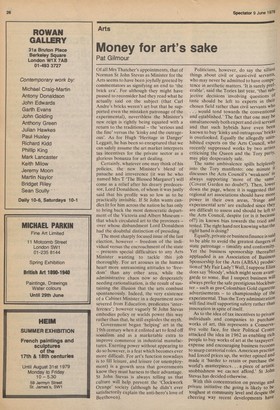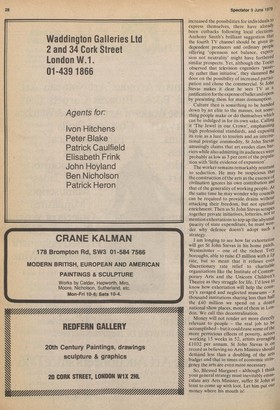Arts
Money for art's sake
Pat Gilmour
Of all Mrs Thatcher's appointments, that of Norman St John Stevas as Minister for the Arts seems to have been joyfully greeted by commentators as signifying an end to 'the brick era'. For although they might have paused to reconsider had they read what he actually Said on the subject (that Carl Andre's bricks weren't art but that he supported even the mistaken patronage of the experimental), neverthless the Minister's new reign is rightly being equated with a return to the traditional — the 'serious and the fine' versus the 'kinky and the outrageous'. As for Hugh 'Heritage in Danger' Leggatt, he has been so enraptured that we can safely assume the art market interprets tax incentives for the private sector as a glorious bonanza for art dealing.
Certainly, whatever one may think of his policies, the new Minister's blend of panache and irreverence (it was he who named Mrs T 'The Blessed Margaret') will come as a relief after his dreary predecessor, Lord Donaldson, of whom it was justly said that his profile was so low as to be practically invisible. If St John wants candles lit for him across the nation he has only to bring back the most democratic department of the Victoria and Albert Museum — that which circulated art to the provinces — over whose disbandment Lord Donaldson had the doubtful distinction of presiding.
The most sharply focused issue of the last election, however — freedom of the individual versus the encroachment of the state — presents special difficulties to any Arts Minister wanting to tackle this job thoroughly. For art arouses in the human heart more unreasoning attitudes to 'freedom' than any other area, while the administrative chaos now so desperately needing rationalisation, is the result of sustaining the illusion that the arts combust spontaneously. Indeed, the very existence of a Cabinet Minister in a department now severed from Education, predicates 'interference'; however vaguely St John Stevas embodies policy or wields power this way rather than that, he still explodes the myth.
Government began 'helping' art in the 19th century when it enlisted art to fend off soeialism and as a marketable extra to improve commerce in industrial manufac tures. Exerting power without appearing to do so however, is a feat which becomes ever more difficult. For art's function nowadays is to fill leisure, and leisure (or unemployment) is a growth area that governments know they must harness to their advantage.
St John Stevas is always telling us that culture will help prevent the 'Clockwork Orange' society (although he didn't ever satisfactorily explain the anti-hero's love of Beethoven). Politicians, however, do say the silliest things about civil or quasi-civil servants, who may never be admitted to have comPetence in aesthetic matters. 'It is surely pref erable', said the Tories last year, 'that subjective decisions involving questions ?f taste should be left to experts in their chosen field rather than civil servants who . . . would tend towards the conventional and established.' The fact that one may be simultaneously both expert and civil servant and that such hybrids have even been known to buy 'kinky and outrageous' bricks is overlooked. Equally the allegedly uninhibited experts on the Arts Council, wh° recently suppressed works by two artists criticising the Queen and the Tory partY, may play desperately safe. The same ambivalence spills helplessly into the Tory manifesto: one minute it discusses the Arts Council's 'weakness' in, always supporting 'more of the same (Covent Garden no doubt?). Then, lower down the page, where it is suggested that regional art associations should have more power in their own areas, 'fringe and experimental arts' are excluded since they are difficult to assess and should be left to the Arts Council, despite (or is it because of?) its known bias towards the tried and tested. The right hand not knowing what the right hand is doing? Equally, private or business finance is said to be able to avoid the greatest dangers of state patronage — timidity and conformitY. Yet the business sponsorship thereafter applauded is an Association of Business Sponsorship for the Arts (ABSA) produc tion of 'My Fair Lady'! Well, I suppose Eliza does say 'bloody', which might seem avant garde to some. But I suspect business will always prefer the safe prestigious blockbuster — such as pre-Colombian Gold cigarette advertisements — to championship of the experimental. Thus the Tory administration will find itself supporting safety rather than innovation in spiteof itself.
As to the idea of tax incentives to private individuals and companies to purchase works of art, this represents a Conservative volte face, for their Political Centre attacked the idea in 1962 as enabling rich people to buy works of art at the taxpayers expense and encouraging business tycoons to usurp curatorial roles. American practice had forced prices up, the writer opined and made it 'harder to retain or purchase the world's masterpieces. . a piece of artistic snobbishness we cal not afford.' St John Stevas has decided otherwise.
With this concentration on prestige and private initiative the going is likely to be toughest at community level and despite the cheering way recent developments have increased the possibilities for individuals to express themselves, there have already been cutbacks following local elections. Anthony Smith's brilliant suggestion that the fourth TV channel should be given independent producers and ordinary peoPle offering 'openness not balance, expression not neutrality' might have furthered similar prospects. Yet, although the Tories observed that television engenders `passtvity rather than initiative', they slammed tte door on the possibility of increased participation and chose the commercial. St John Stevas makes it clear he sees TV as a justification for the expense of balle t and opera by presenting them for mass consumption. Culture then is something to be handed down by an elite to the masses, not some' thing people make or do themselves which can be indulged in for its own sake. Calling it 'The Jewel in our Crown', emphasising high professional standards, and exposing its role as a lure to tourists and an international prestige commodity, St John Stevas amusingly claims that art erodes class barriers while also admitting its audiences were probably as low as 3 per cent of the population with 'little evidence of expansion'.
The worker remains remarkably resistant to seduction. He may be suspicious that the construction of the arts as the essence of civilisation ignores his own contribution and that of the generality of working people. At the same time he. may wonder why councils can be required to provide drains without attacking their freedom, but not spiritual enrichment. Then as St John Stevas scrape together private initiatives, lotteries, not to mention exhortations to top up the abysmal paucity of state expenditure, he must wonder why defence doesn't adopt such strategy.
I am longing to see how far exhortation will get St John Stevas in his home patchy Westminster — one of the richest TorY boroughs, able to raise £3 million with a 1p rate, but so mean that it refuses even discretionary rate relief to charitable organisations like the Institute of Content' porary Arts and the Unicorn Children's Theatre as they struggle for life. I'd love to know how exhortation will help the courttry's ravaged and neglected museums — a thousand institutions sharing less than half the £40 million we spend on a dozen national show places, most of them in London. We call this decentralisation.
Money will not render art more directlY relevant to people — the real job to be accomplished — but it could ease some of the more pernicious effects of poverty, actors working 15 weeks in 52, artists averaging £1032 per annum. St John Stevas is on record as believing no Arts Minister should demand less than a doubling of the arts budget and that in times of economic stringency the arts are even more necessary. So, Blessed Margaret — although I think your general strategy must inevitably emasculate any Arts Minister, suffer St John at least to come up with loot. Let him put our money where his mouth is!











































 Previous page
Previous page